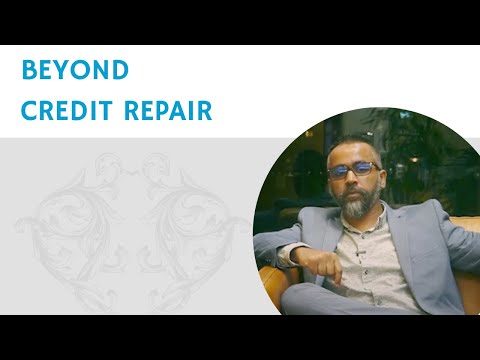In this thought-provoking article, you will explore the intriguing concept of “Beyond Credit Repair.” Delving into the depths of the financial realm, this article unveils a comprehensive perspective that surpasses the traditional notions of credit restoration. By challenging the conventional wisdom surrounding credit repair, this insightful piece aims to broaden your understanding of financial well-being and provide a fresh outlook on achieving a secure financial future. Prepare to embark on a captivating journey into the realm of credit, where you will discover enlightening insights and discover new possibilities that surpass the boundaries of mere repair.
Alternative Solutions to Credit Repair
1. Debt Consolidation
Debt consolidation is a strategy that can help individuals facing multiple high-interest debts to manage their finances more effectively. By combining all outstanding debts into a single loan with a lower interest rate, borrowers can simplify their monthly payments and potentially save money in interest charges. This approach not only makes it easier to keep track of debts but can also provide an opportunity to negotiate more favorable repayment terms.
2. Secured Credit Card
For individuals with poor or limited credit history, obtaining a traditional credit card can be challenging. However, secured credit cards offer an alternative solution. These cards require a cash deposit as collateral, which reduces the risk for lenders and makes them more accessible to individuals with low credit scores. By using a secured credit card responsibly and making timely payments, individuals can rebuild their credit and demonstrate financial responsibility over time.
3. Credit Counseling
Credit counseling is a valuable resource for individuals seeking guidance and support in managing their finances. Credit counselors are trained professionals who can help create personalized plans to address debt, improve credit scores, and develop effective budgeting strategies. They provide individuals with valuable insights and offer solutions tailored to their specific financial situations. Credit counseling can be particularly beneficial for those who need expert guidance and assistance in managing their credit repair journey.
4. Credit Builder Loans
Credit builder loans are designed to help individuals establish or improve their credit history. These loans work by setting aside a specific amount of money in a secured account, which the borrower gradually repays. The lender reports the borrower’s timely payments to credit bureaus, which, in turn, helps build a positive credit history. Over time, successfully repaying a credit builder loan can lead to an improved credit score and open doors to more favorable financial opportunities.
Financial Education and Budgeting
1. Importance of Financial Education
Financial education plays a crucial role in empowering individuals to make informed decisions about their finances. By understanding key financial concepts such as budgeting, saving, investing, and debt management, individuals can develop strategies to improve their financial well-being. Financial education provides the necessary knowledge and skills to navigate complex financial systems and make sound money-related decisions.
2. Creating a Budget
Creating a budget is an essential component of effective financial management. A budget helps individuals track their income, expenses, and savings, allowing for better control over their financial situations. By setting realistic financial goals and allocating funds accordingly, individuals can prioritize their spending and ensure that they are not overspending or accumulating unnecessary debts. A well-planned budget provides a roadmap for financial success and helps individuals achieve their long-term financial goals.
3. Tracking Expenses
Tracking expenses is a fundamental aspect of financial management. By keeping a detailed record of all expenditures, individuals can gain insight into their spending habits and identify areas where they can potentially cut back to save money. Additionally, tracking expenses enables individuals to monitor their progress towards their financial goals and make necessary adjustments to their budgeting strategies when needed. Various smartphone apps and online tools are available to simplify expense tracking and provide comprehensive reports for analysis.
4. Saving Strategies
Developing effective saving strategies is key to achieving financial stability and long-term success. Individuals should aim to establish an emergency fund to cover unexpected expenses and create a buffer against financial hardship. Automatic savings plans can be employed to ensure a consistent saving habit, where a predetermined amount is automatically deducted from income and deposited into a savings account. Exploring different saving options, such as high-yield savings accounts or investment vehicles, can maximize the growth potential of saved funds and help individuals reach their financial goals faster.

This image is property of Amazon.com.
Building a Positive Credit History
1. Paying Bills on Time
One of the most crucial factors in building a positive credit history is consistently paying bills on time. Late or missed payments can have a significant negative impact on credit scores and make it challenging to obtain credit in the future. Establishing a system for timely bill payment, such as setting up automatic payments or utilizing reminder notifications, can help individuals stay on top of their financial obligations and demonstrate responsible credit behavior.
2. Maintaining Low Credit Utilization
Credit utilization refers to the percentage of available credit individuals are using at any given time. Maintaining a low credit utilization ratio, typically below 30%, is vital in building a positive credit history. This shows lenders that individuals are responsible borrowers who can effectively manage their available credit. To achieve this, individuals can pay down existing debts, request credit limit increases, or explore debt consolidation options to lower their credit utilization ratio.
3. Diversifying Credit Types
Having a mix of different credit types, such as credit cards, loans, and mortgages, can help individuals build a more robust credit history. Lenders like to see that individuals can manage various types of credit responsibly. However, it is important to only take on credit that is necessary and can be comfortably repaid. Careful consideration should be given to taking on additional credit to avoid overextending oneself and risking financial instability.
4. Regularly Reviewing Credit Reports
Regularly reviewing credit reports is essential to ensure accuracy and identify any potential errors or fraudulent activities. By obtaining a free copy of their credit report annually, individuals can carefully examine the information provided and address any discrepancies promptly. Additionally, reviewing credit reports allows individuals to track their progress in credit repair and identify areas for improvement. By monitoring credit reports regularly, individuals can proactively manage their credit and take corrective actions if necessary.
Managing Debt Effectively
1. Prioritizing Debt Repayment
Effectively managing debt starts with prioritizing debt repayment. By assessing all outstanding debts and prioritizing them based on interest rates and repayment terms, individuals can develop a structured repayment plan. This approach helps individuals focus on paying off high-interest debts first, saving money on interest charges, and gradually working towards becoming debt-free.
2. Negotiating with Creditors
When facing financial challenges and struggling with debt repayment, individuals can explore the option of negotiating with creditors. Creditors may be willing to negotiate reduced interest rates, extended payment terms, or even partial forgiveness of outstanding balances in certain situations. Open and honest communication with creditors can lead to more manageable repayment arrangements, alleviate financial stress, and potentially save individuals from more severe consequences like bankruptcy.
3. Avoiding High-Interest Loans
High-interest loans can be detrimental to an individual’s financial well-being, as they can quickly accumulate substantial interest charges. It is important to avoid taking on loans with excessively high interest rates whenever possible. Instead, individuals should explore alternative options, such as credit unions or peer-to-peer lending platforms, which often offer more favorable interest rates. Additionally, improving credit scores and building a positive credit history can increase the likelihood of securing loans with lower interest rates in the future.
4. Refinancing Options
Refinancing existing debts can be a viable strategy to manage debt more effectively. By refinancing, individuals can secure a new loan with better terms, such as a lower interest rate or extended repayment period. This can lead to reduced monthly payments and more manageable debt burdens. It is important to carefully evaluate the terms and conditions of any refinancing options and consider any associated fees or potential consequences before proceeding.

This image is property of s3-media0.fl.yelpcdn.com.
Improving Income and Financial Stability
1. Exploring Career Growth
Increasing income and improving financial stability often go hand in hand. Individuals can explore various avenues for career growth, such as acquiring new skills, pursuing advanced education, or seeking promotions within their current profession. By proactively investing in career development, individuals can enhance their earning potential and create opportunities for higher-paying positions in the future.
2. Additional Income Sources
Supplementing existing income with additional sources can have a significant impact on an individual’s financial stability. This can be achieved through various means, such as taking on a part-time job, freelancing, or starting a small business. By diversifying income streams, individuals can reduce reliance on a single source of income, build savings faster, and improve overall financial resilience.
3. Emergency Fund
Establishing an emergency fund is essential to protect against unforeseen financial setbacks. An emergency fund should ideally cover three to six months’ worth of living expenses and should be easily accessible for emergencies. This financial cushion provides individuals with peace of mind and ensures they are able to weather unexpected life events without accumulating excessive debt.
4. Retirement Planning
While it may seem unrelated to credit repair, retirement planning is an integral part of long-term financial stability. By starting early and consistently contributing to retirement savings accounts like 401(k)s or IRAs, individuals can secure their financial future. Planning for retirement ensures individuals have enough funds to support themselves in their golden years and minimizes the risk of relying on credit during retirement.
Understanding Credit Scores and Reporting
1. How Credit Scores are Calculated
Credit scores are calculated based on various factors, including payment history, credit utilization, length of credit history, credit mix, and new credit inquiries. Each factor carries a different weightage in credit score calculations. Payment history and credit utilization have the most significant impact on credit scores. By understanding how credit scores are calculated, individuals can identify areas for improvement and take steps to address any negative factors.
2. Importance of Credit Reports
Credit reports play a vital role in credit repair and financial management. They provide detailed information about an individual’s credit history, including all open and closed accounts, payment history, and public records. Credit reports are used by lenders to assess creditworthiness and determine interest rates and loan approvals. Regularly reviewing credit reports allows individuals to identify any errors or discrepancies that could be negatively impacting their credit scores.
3. Detecting and Correcting Errors
Errors on credit reports can occur and negatively impact credit scores. It is essential for individuals to regularly review their credit reports and promptly address any inaccuracies. If errors or discrepancies are detected, individuals should file a dispute with the credit reporting agencies and provide supporting documentation to rectify the errors. Taking proactive steps to correct errors can prevent unnecessary credit repair challenges and ensure accurate credit reporting.
4. Managing Identity Theft
Identity theft can have severe consequences on an individual’s credit history and overall financial well-being. It is crucial to take steps to protect personal information and monitor for any signs of fraudulent activity. This can include regularly checking credit reports for unfamiliar accounts or inquiries, using secure online platforms for financial transactions, and utilizing identity theft protection services. In the event of identity theft, individuals should report the incident immediately to the relevant authorities and take necessary actions to mitigate any potential damage.

This image is property of i.ytimg.com.
Alternative Paths to Financial Success
1. Starting a Side Business
Starting a side business can provide individuals with an additional income stream and open up potential tax benefits. Individuals can leverage their skills or hobbies to offer products or services, either online or in their local community. While starting a business requires dedication and hard work, it can offer the opportunity to earn supplemental income and potentially grow into a full-time venture.
2. Investing for the Future
Investing is a powerful wealth-building strategy that can lead to long-term financial success. Individuals can explore various investment options, such as stocks, bonds, mutual funds, or real estate, based on their risk tolerance and investment goals. Investing should be approached with careful consideration, research, and, if necessary, consultation with a financial advisor. With time and smart investment choices, individuals can potentially grow their wealth and secure their financial future.
3. Real Estate Strategies
Real estate can be a profitable investment avenue for individuals seeking alternative paths to financial success. Investing in rental properties or real estate investment trusts (REITs) can generate passive income and provide potential appreciation in property values over time. However, real estate investing requires careful analysis of market conditions, property selection, and financial planning to minimize risks and maximize returns.
4. Entrepreneurship Opportunities
Entrepreneurship offers individuals the opportunity to build their own business and create financial success on their terms. It allows individuals to pursue their passions, take control of their financial destinies, and potentially achieve significant financial rewards. However, entrepreneurship is not without its challenges and risks. Individuals considering entrepreneurship should conduct thorough market research, develop a comprehensive business plan, and be prepared to invest time, effort, and resources to succeed.
Long-Term Financial Planning
1. Setting Financial Goals
Setting clear financial goals is essential for long-term financial planning. By defining specific objectives, individuals can develop a roadmap for achieving their desired financial outcomes. Financial goals can include saving for a down payment on a home, paying off student loans, building an emergency fund, or retiring comfortably. Setting realistic and measurable goals provides individuals with motivation and purpose as they work towards their financial aspirations.
2. Retirement Planning
Planning for retirement is a critical aspect of long-term financial planning. Individuals should assess their retirement needs, consider factors such as inflation and healthcare costs, and calculate the amount of money required to support their desired lifestyle during retirement. Various retirement savings vehicles, such as employer-sponsored retirement plans and individual retirement accounts (IRAs), can be utilized to accumulate funds over time. Starting early and consistently contributing to retirement savings is key to ensure a financially secure retirement.
3. Estate Planning
Estate planning involves making arrangements for the management and distribution of assets in the event of incapacitation or death. It involves creating legal documents such as wills, trusts, and power of attorney to ensure that assets are protected and passed on according to the individual’s wishes. Estate planning also includes considering factors such as healthcare directives, guardianship of minors, and minimizing estate taxes. Seeking professional guidance from an estate planning attorney can help individuals navigate the complexities of estate planning and ensure their wishes are carried out.
4. Wealth Generation Strategies
Wealth generation strategies focus on building and growing wealth over the long term. These strategies can include investments, entrepreneurship, real estate, and other avenues for generating passive income. Wealth generation involves assessing risk tolerance, diversifying investments, regularly reviewing financial portfolios, and adapting strategies based on changing market conditions. Consulting with a financial advisor can provide individuals with expert guidance and tailored wealth generation strategies that align with their financial goals.

This image is property of s3-media0.fl.yelpcdn.com.
Developing Responsible Financial Habits
1. Avoiding Impulse Spending
Developing responsible financial habits begins with avoiding impulse spending. Impulse purchases can lead to financial strain and undermine long-term financial goals. Individuals should practice mindful spending by evaluating needs versus wants, considering the value and utility of a purchase, and maintaining self-discipline when faced with impulsive buying temptations. By curbing impulsive spending, individuals can allocate their financial resources more effectively and make conscious choices that align with their financial goals.
2. Tracking and Analyzing Expenses
Tracking and analyzing expenses are essential components of responsible financial management. By regularly reviewing and categorizing expenditures, individuals can identify spending patterns, pinpoint areas of potential overspending, and make informed adjustments to their budget. Understanding where money is being allocated allows individuals to prioritize expenses, cut unnecessary costs, and allocate funds towards savings or debt repayment.
3. Practicing Financial Discipline
Practicing financial discipline is crucial to maintaining overall financial stability. Individuals should strive to live within their means, avoid unnecessary debts, and resist the temptation of impulsive purchases. By adhering to budgetary constraints, individuals can build up their savings, reduce reliance on credit, and create a solid foundation for long-term financial success.
4. Setting Realistic Budgets
Setting realistic budgets is key to achieving financial goals effectively. Budgets should be based on an accurate assessment of income, expenses, and financial priorities. It is important to allocate funds towards essential expenses, debt repayment, savings, and discretionary spending in a balanced and sustainable manner. Setting realistic budgets ensures individuals can maintain financial stability while still enjoying a reasonable quality of life.
Utilizing Technology for Financial Management
1. Budgeting and Expense Tracking Apps
Budgeting and expense tracking apps have become highly popular tools for individuals seeking to manage their finances effectively. These apps provide features such as real-time expense tracking, automated budget categorization, bill payment reminders, and comprehensive financial reports. Utilizing these apps can simplify the budgeting process, improve expense management, and enhance overall financial awareness.
2. Robo-Advisors and Investment Platforms
Robo-advisors and investment platforms offer individuals convenient and cost-effective ways to invest and manage their portfolios. These platforms leverage technology and algorithms to provide automated investment advice and management services. They offer advantages such as low fees, diversification of investments, and easy accessibility. Robo-advisors and investment platforms can be particularly beneficial for individuals who prefer a hands-off approach to investing or lack the expertise and time to manage their investments actively.
3. Online Banking and Financial Tools
Online banking and financial tools have revolutionized the way individuals manage their finances. These platforms provide convenient access to banking services, such as account management, bill payment, and fund transfers. Online platforms also offer financial tools and calculators to help individuals plan and track their financial goals. By utilizing online banking and financial tools, individuals can streamline their financial management, save time, and gain a comprehensive overview of their financial situation.
4. Protecting Personal Information Online
As technology advances, it is crucial to prioritize the protection of personal information online. Individuals should implement strong and unique passwords for their financial accounts, enable two-factor authentication where available, and be cautious when sharing sensitive information online. Regularly monitoring financial accounts for any suspicious activities or unauthorized transactions is also essential. By taking proactive measures to protect personal information, individuals can mitigate the risk of identity theft and financial fraud.
In conclusion, beyond credit repair, individuals have numerous alternative solutions and strategies to improve their financial well-being. By utilizing debt consolidation, developing effective budgeting habits, building a positive credit history, managing debt responsibly, increasing income, understanding credit scores and reporting, exploring alternative paths to financial success, engaging in long-term financial planning, developing responsible financial habits, and utilizing technology for financial management, individuals can enhance their financial stability, achieve their goals, and secure a brighter financial future. It is essential for individuals to invest time and effort into learning about these alternative solutions and implementing them consistently to reap the benefits of improved financial health and success.

This image is property of Amazon.com.
